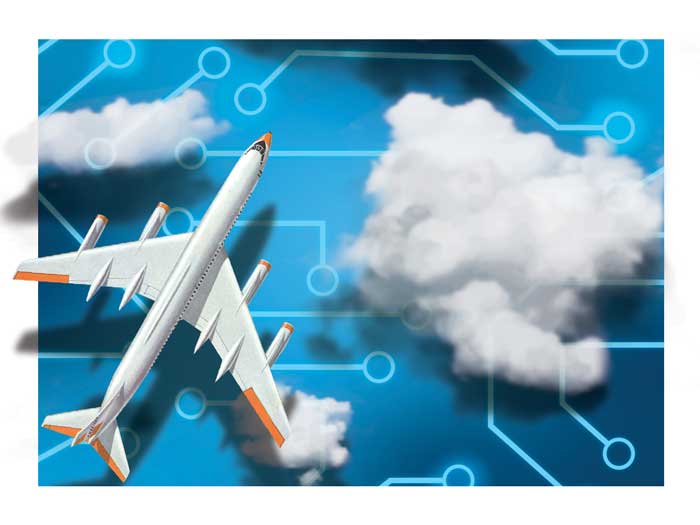
The travel industry is using AI to help clients and boost revenue
 Up until now, travel has trailed other industries when it comes to using artificial intelligence (Illustration by Matthew Billington)
Up until now, travel has trailed other industries when it comes to using artificial intelligence (Illustration by Matthew Billington)
Bryan Baker admits that travel is behind other industries when it comes to using artificial intelligence (AI). In February 2022, he became the first vice-president of analytics and insights at Fresh Tracks Canada, a 26-year-old Vancouver-based vacation planning company. “When you look across industries, travel and tourism, in general, is one that is catching up in that space,” Baker explains. “It’s been a big priority for Sushant Trivedi, our CEO, to ramp up the analytical and data powerhouse of our organization to help us work smarter.”
For Fresh Tracks, ‘work smarter’ means leveraging its mountains of data—they’ve sent more than 25,000 people on trips since the company started in 1996, and regularly gather customers’ feedback via post-vacation surveys—to inspire repeat travellers. AI also helps Fresh Tracks target which website visitors are more likely to make a purchase using an algorithm developed internally with an analytics partner. Once a prospective customer fills out a form to request a quote for a trip, Fresh Tracks can then see how many brochures they’ve downloaded from the website, and how many promotional emails they’ve opened. The algorithm determines what combination of actions tends to lead to a booking. “It’s all based on what has happened in the past, but it's updating in real-time every day because those interactions change every day,” says Baker.
This also helps the company allocate the time of its sales agents more strategically, and improve the customer experience too. “We don't want to call people if they’re not ready to book a trip,” Baker says. “We want to be there when they’re ready.”
The algorithms and Fresh Tracks’ new loyalty program, both of which were deployed in early October 2022 have already proved fruitful. The company’s current fiscal year shows bookings from repeat customers jumped from 0.4 per cent to 6 per cent. Baker remains hopeful about their ongoing impact. “As opposed to us treating our customers like one-and-done bucket list travellers, this gives us an opportunity to maintain that relationship and inspire future travel experiences,” he explains.
Fresh Tracks isn’t the only travel company that’s leveraging AI and data to build its business. According to a 2020 article by Jacques Bulchand-Gidumal, professor of digital business and tourism at the University Institute for Tourism and Sustainable Economic Development at the University of Las Palmas de Gran Canaria, “tourists provide data before, during, and after their trip in five ways: online activities, offline activities, biometric and emotional data,
wearables, and user-generated content… A user profile can be created by joining these data sources together. This profile can then be used to recommend products and services that are tailored to the user’s needs.” But the benefits go beyond simply increasing the number of bookings a travel company receives; AI can also be used to improve customer experience, track customer preferences more accurately, save on labour costs and even assist with brand management by tracking negative reviews.
Unsurprisingly, the companies that have best harnessed AI are booking websites such as Airbnb and TripAdvisor, which are using machine learning to guess what type of trip a website visitor is looking to book next based on their past bookings or even their IP address. “A lot of it is looking through the analytics and coming up with a good prediction of the highest probability of what that traveller wants to do,” says Robert Cole, a hotel marketing strategy and travel technology consultant.
But other sectors, including the hotel industry, are still lagging behind when it comes to data and automation, Cole says. Hotels could be using past customer data to predict future needs based on data from prior stays—say, a feather-free pillow or opting out of turndown service.
Customization to this degree is commonplace in luxury hotels, where staff may manually enter preferences and data in a customer profile. But data and AI can help midrange properties offer similar services, at scale, without the high cost of labour. The issue is, according to Cole, outdated booking and operational systems. “They’re really old but reliable,” says Cole. “They may centrally be able to keep track of certain preferences, but to really get that down operationally into the property where it’s systematized, it gets very, very complicated.”
However, some mid-range hotels are taking steps toward this level of customization with apps like Marriot’s Bonvoy. “I can open up an app and I can check off all the things I want, like an early check-in, a toothbrush kit, a shaving kit and extra blankets,” says Jason Schenker, a financial futurist and chairman of the Futurist Institute. The apps offer a “semi-customized” experience, though the onus is still on guests to make those requests.
Still, despite its potential, most travel companies aren’t yet keeping the right, or enough, records to take advantage of AI, according to Cole. “True AI requires very large, clean data sets,” he explains. “Much of the travel industry, for example, a highly fragmented hotel industry, simply lacks the quality data at a scale that AI requires to create reliable results.”
Of course, there are some precautions travel companies must take when they begin harnessing data. “Every company you’ve ever booked a trip with likely has historical data about where you stayed,” Schenker says. “This is true of all companies, but [travel companies] have a fiduciary duty to try to keep that data as safe as possible, especially because it might have personally identifying information.”
But since automation, AI and data are the way of the future (according to Schenker) these precautions are necessary. Travel companies, like all organizations, will need to become data-first to remain competitive, he says. “As data becomes more important, every company that wants to be successful in the decades ahead has to be, at its core, a tech company.”
EXPLORE NEW USES OF AI AND MORE
Check out CPA Canada's extensive resources on tech subjects such as AI and automation, and learn more about data through its data management foundations and advanced data management certificates.